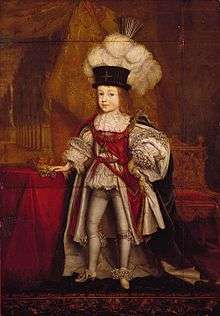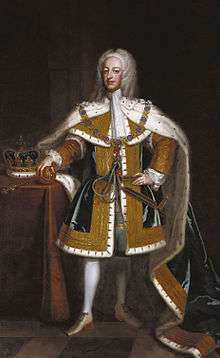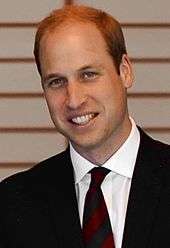Duke of Cambridge
| Dukedom of Cambridge | |
|---|---|
 | |
| Creation date | 29 April 2011 |
| Monarch | Elizabeth II |
| Peerage | Peerage of the United Kingdom |
| First holder | James Stuart |
| Present holder | Prince William |
| Heir apparent | Prince George |
| Remainder to | the 1st Duke's heirs male of the body lawfully begotten |
| Subsidiary titles |
Earl of Strathearn Baron Carrickfergus |

Duke of Cambridge, one of several royal dukedoms in the United Kingdom, is a hereditary title of specific rank of nobility in the British Royal Family. The title (named after the city of Cambridge in England) is hereditary among male agnatic descendants of the titleholder by primogeniture, and has been conferred upon members of the British royal family several times. The wife of the titleholder is called Duchess of Cambridge.
The title goes back to the 17th century, and superseded an earlier title of Earl of Cambridge. The title became extinct several times, before being revived after a hiatus of over a hundred years in 2011, when it was bestowed upon Prince William on 29 April 2011 upon his marriage on the same day to Catherine Middleton.
History
The title was first granted to Charles (1660–1661), the first son of the Duke of York (later King James II), though he was never formally created Duke of Cambridge because he had died at the age of six months. The first officially recognised creation of the dukedom was in the Peerage of England in 1664, when James Stuart, second son of the Duke of York, was granted the title, but he died early in 1667 at the age of three, and the title again became extinct. The title was then granted later that year to the third son of the Duke of York, Edgar, but he then died in 1671 at the age of three, and the title again became extinct. The Duke of York's eldest son by his second wife, Charles, was also styled Duke of Cambridge in 1677, but died when about a month old, not having lived long enough to be formally created duke.
The title was recreated in 1706 and granted to George Augustus, son of the Elector of Hanover (later King George I). When George Augustus ascended to the throne as King George II in 1727, the dukedom merged with the crown.[1]
The title was again recreated and given, in the Peerage of the United Kingdom, to Prince Adolphus, the seventh son of King George III.[2] The title was inherited in 1850 by his only son, Prince George, but upon his death in 1904, the title again became extinct.[3]
The grandson (though a female line) of the first duke of the fourth creation, Adolphus, Duke of Teck, the brother-in-law of King George V, was created Marquess of Cambridge (including Earl of Eltham, and Viscount Northallerton) in 1917 when he gave up his German titles and took the surname "Cambridge".[4] Upon the death of the second Marquess without any male heirs, the marquessate became extinct.
During the period leading up to the 1999 wedding of The Prince Edward, the youngest son of Queen Elizabeth II, experts speculated that the dukedom of Cambridge or Sussex were the most likely to be granted to him, and The Sunday Telegraph later reported that Prince Edward was at one point set to be titled Duke of Cambridge.[5] Instead, Prince Edward was created Earl of Wessex, and it was announced that he would eventually be created the next Duke of Edinburgh after his father.[6]
On 29 April 2011, the day of his wedding, it was announced that Prince William was to be created Duke of Cambridge, Earl of Strathearn and Baron Carrickfergus.[1] The letters patent granting these titles received the great seal on 26 May 2011.[7]
Dukes of Cambridge
Styled (1660–1661)
| Duke | Portrait | Birth | Marriages | Death |
|---|---|---|---|---|
| Charles Stuart House of Stuart 1660–1661 |
no portrait | 22 October 1660 Worcester House, London son of James, Duke of York, and Anne Hyde |
not married | 5 May 1661 Whitehall Palace, London |
First creation (1664–1667)
| Duke | Portrait | Birth | Marriages | Death |
|---|---|---|---|---|
| James Stuart House of Stuart 1664–1667 also: Earl of Cambridge, Baron of Dauntsey (1664–1667) |
 |
12 July 1663 St James's Palace, London son of James, Duke of York, and Anne Hyde |
not married | 20 June 1667 Richmond Palace, London |
Second creation (1667–1671)
| Duke | Portrait | Birth | Marriages | Death |
|---|---|---|---|---|
| Edgar Stuart House of Stuart 1667–1671 also: Earl of Cambridge, Baron of Dauntsey (1667–1671) |
no portrait | 14 September 1667 St James's Palace, London son of James, Duke of York, and Anne Hyde |
not married | 8 June 1671 Richmond Palace, London |
Styled (1677–1677)
| Duke | Portrait | Birth | Marriages | Death |
|---|---|---|---|---|
| Charles Stuart House of Stuart 1677–1677 |
no portrait | 7 November 1677 St James's Palace, London son of James, Duke of York, and Princess Mary of Modena |
not married | 12 December 1677 St James's Palace, London |
Third creation (1706–1727)
| Duke | Portrait | Birth | Marriages | Death |
|---|---|---|---|---|
| Prince George Augustus House of Hanover 1706–1727 also: Marquess of Cambridge, Earl of Milford Haven, Viscount Northallerton, Baron Tewkesbury (1706–1727); Prince of Wales, Duke of Cornwall, Duke of Rothesay (1714–1727) |
 |
30 October / 9 November 1683O.S./N.S. Herrenhausen Palace or Leine Palace, Hanover son of George Louis, Prince-Elector, Duke of Brunswick-Lüneburg, and Sophia Dorothea of Celle |
22 August 1705 Caroline of Ansbach |
25 October 1760 Kensington Palace, London |
| Prince George succeeded as George II in 1727 upon his father's death, and his titles merged with the crown. | ||||
Fourth creation (1801–1904)
| Duke | Portrait | Birth | Marriages | Death |
|---|---|---|---|---|
| The Prince Adolphus House of Hanover 1801–1850 also: Earl of Tipperary, Baron Culloden (1801–1850) |
|
24 February 1774 Buckingham Palace, Westminster son of George III and Charlotte of Mecklenburg-Strelitz |
18 June 1818 Princess Augusta of Hesse-Cassel |
8 July 1850 Cambridge House, Piccadilly, London |
| Prince George House of Hanover 1850–1904 also: Earl of Tipperary, Baron Culloden (1850–1904) |
 |
26 March 1819 Cambridge House, Hanover son of Prince Adolphus, Duke of Cambridge, and Princess Augusta of Hesse-Cassel |
8 January 1847 Sarah Fairbrother |
17 March 1904 Gloucester House, Piccadilly, London |
Fifth creation (2011–present)
| Duke | Portrait | Birth | Marriages | Death |
|---|---|---|---|---|
| Prince William House of Windsor 2011–present also: Earl of Strathearn, Baron Carrickfergus (2011–present) |
 |
21 June 1982 St. Mary's Hospital, London son of Charles, Prince of Wales, and Lady Diana Spencer |
29 April 2011 Catherine Middleton |
Line of succession
The heir apparent to the extant dukedom and the subsidiary titles is the son of Prince William, Prince George of Cambridge (born 2013). Should Prince William become king, the title will again merge with the Crown.
Marquesses of Cambridge (1917–1981)
- Adolphus Cambridge, 1st Marquess of Cambridge (1868–1927), son of a daughter of Prince Adolphus, was created Marquess when George V relinquished his family's German titles
- George Francis Hugh Cambridge, 2nd Marquess of Cambridge (1895–1981), only son of the 1st Marquess, died without male issue and his honours became extinct
Family tree
See also
- Duke of Cambridge's Personal Canadian Flag
- Earl of Cambridge
- Duke of Cambridge Public School - Bowmanville, Ontario, Canada
References
- 1 2 "Announcement of Titles: Statement issued by the press secretary to The Queen". The Royal Household. 29 April 2011. Archived from the original on 30 April 2011. Retrieved 2012-04-30.
- ↑ "No. 15429". The London Gazette. 21 November 1801. p. 1403.
- ↑ Tim Ross (16 November 2010). "Could William and Kate be the next Duke and Duchess of Cambridge?". The Telegraph. telegraph.co.uk. Retrieved 11 February 2012.
- ↑ "No. 30374". The London Gazette. 9 November 1917. pp. 11592–11594.
- ↑ Richard Eden (12 December 2010). "Royal wedding: Prince William asks the Queen not to make him a duke". The Telegraph. telegraph.co.uk. Retrieved 12 December 2010.
- ↑ "The Earl of Wessex-Styles and Titles". The Royal Household. Retrieved 2012-04-30.
- ↑ "No. 59798". The London Gazette. 1 June 2011. p. 10297.
